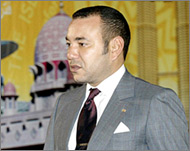Muslim countries in Iraq resolution U-turn
Islamic countries have agreed to drop a contentious draft resolution calling for a timetable for the end of the US-led occupation of Iraq.

The nations made the climbdown in the face of opposition from US-appointed Iraqi leaders at the Organisation of Islamic Conference summit in Malaysia on Thursday.
Ayad Allawi, representing Iraq’s US-appointed Governing Council, said he was also unhappy with the resolution’s call for the United Nations to take a central role in the transition to democracy.
“The draft (resolution at the Islamic summit) contains a lot of interference in the internal affairs of Iraq, it will be replaced by a political statement,” Allawi said.
Troop withdrawal
The U-turn comes before a planned New York UN Security Council vote on a US resolution which has no timetable for a troop withdrawal or elections for a new government.
The US resolution is aimed at winning UN approval for its role in Iraq following its overthrow of Saddam Hussein in April, and to win troops and cash from other countries to help in reconstruction.
Muhammad Sarhan, director for International Organisations for United Arab Emirates, said the revised statement would “confirm the sovereignty of Iraq, and (urge) the withdrawal of US forces from Iraq and the role of UN in (Iraq)”.
He said the Governing Council had come under pressure from the US to have the resolution withdrawn.
Weak resolution
|
“The draft (resolution at the Islamic summit) contains a lot of interference in the internal affairs of Iraq, it will be replaced by a political statement” Ayad Allawi,Iraqi Governing Council |
“When the resolution was out, the Americans saw the resolution and they started to put pressure on them,” he said.
“The resolution has become a political declaration, but it will be very weak.”
The OIC draft had called for the United Nations to play a “central role in Iraq, covering all aspects of transition”, and for the Security Council to set a “defined and clear timetable for the withdrawal of occupying powers as soon as possible”.
The climbdown came after the United States agreed to postpone a UN Security Council vote until Thursday in an attempt to get maximum support for its plans for Iraqi reconstruction.
Iraq elections
The US resolution gives the Governing Council until 15 December to spell out a timetable for writing a constitution and holding elections – in effect, a deadline to set a later deadline for when the occupation might end.
Allawi said he approved of the revised Security Council resolution.
“It is a good draft resolution, it gives more power to the Iraqis, it requests that sovereignty be transferred quickly to the Iraqis.”
Most of the 57 members of the OIC were opposed to the US invasion of Iraq – Kuwait was one of the few exceptions – and they want US troops withdrawn as soon as possible.
Islam and violence
 |
|
Muhammad VI said ”terrorism” |
Meanwhile, the world’s Islamic nations must take steps to erase the smear associating their religion with violence, Muslim leaders have said.
The OIC summit heard that such an image must be countered by addressing the root causes of fanaticism, and by a campaign against the general association of Islam and acts of violence.
“Terrorism has been and still is one of the major challenges facing us. It has made incursions into a number of Islamic countries with a view to destabilising them,” Morocco’s King Muhammad VI said.
Indonesian President Megawati Sukarnoputri said terrorist acts “have not only caused loss in human life and property but also have created false perceptions about Islam as if it is the religion of violence and aggression.”
Human rights
And OIC Secretary-General Abdelouahed Belkeziz said “smear campaigns and blatant discrimination” against Muslims in some countries had intensified after the September 11 attacks.
“More damaging to the reputation of Islam and Muslims is the upsurge in religious extremism, fanaticism and zealotry, which have been recently associated with violence and terrorism,” he said, citing the attacks in Bali, Riyadh and Casablanca.
“The gravity of such extremism and zealotry is greater than the false accusations made and injustices committed against us,” he said, adding that “this situation requires that we effectively address the causes of such extremism that veers religion off its noble goals.”
Many of the 57 Muslim nations at the OIC meeting are facing growing oppostion from Islamic groups who complain their rulers are illegitimate, tyrannical and unrepresentative.
Meanwhile, human rights organisations have accused several Muslim countries of cracking down on their domestic opposition under the guise of “fighting terrorism”.